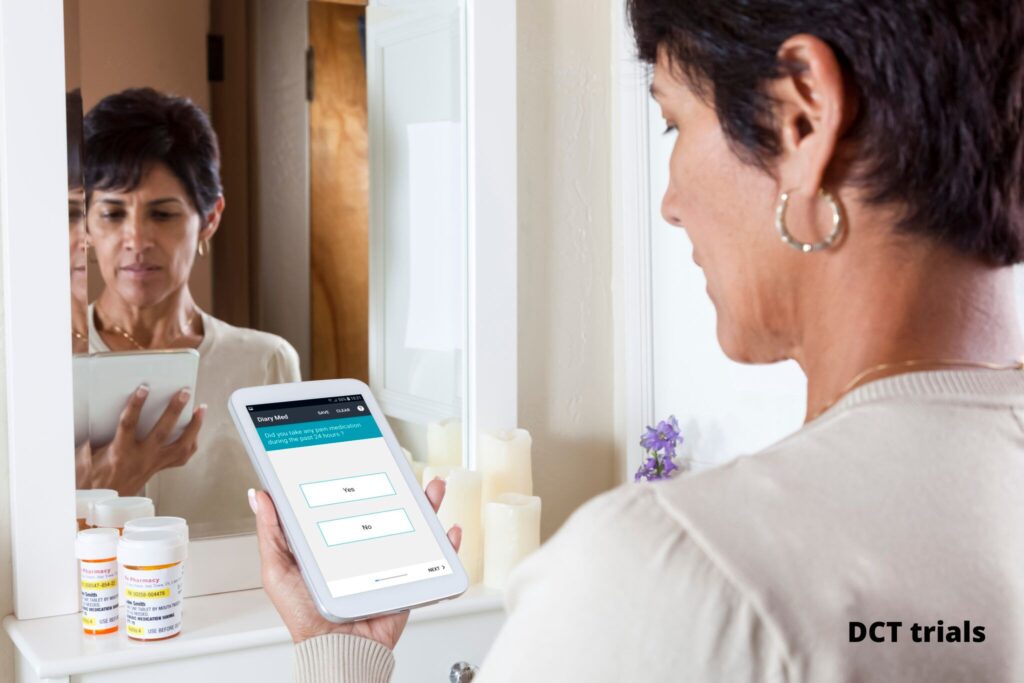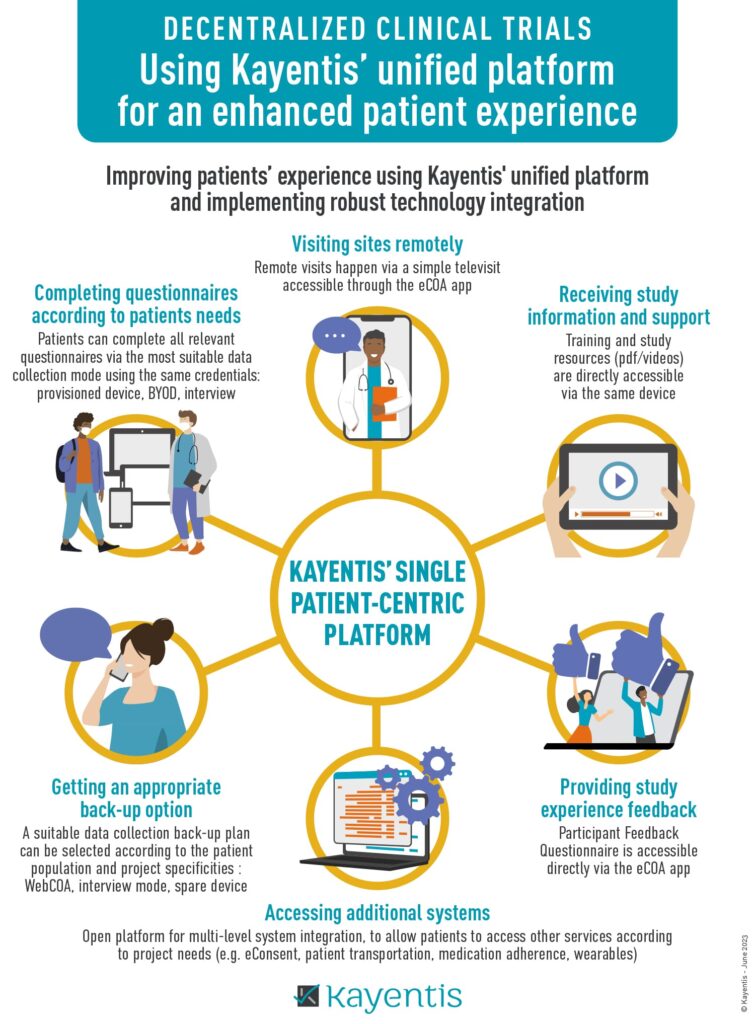The added value of a single platform
DCT trials means bringing the study to the patient’s environment instead of asking the patient to attend the study center. They are therefore recognized as a necessary part of the new clinical trial paradigm. They respond to several of the long-lasting challenges that clinical trials stakeholders have been facing, such as patient enrollment and retention, patient compliance, data loss, data integrity, and data aggregation. Now is the time to switch to DCTs: patients are ready and the technology has evolved. But the success of DCTs requires operational caution and the integration of different systems. Although newly developed technologies support the implementation of DCTs, the accumulation of several layers can create significant complexity and can have an immediate negative impact on users. How can we be sure to build integrated systems that facilitate the utilization of these technologies, and as such drive patient and site engagement?
DCT trials
Why is it necessary to switch to this type of clinical trial?
- Decentralizing clinical trials responds to several challenges
Unlocking the potential of DCTs will tackle several of the long-lasting challenges of the clinical trials industry: implementing DCT tools and approaches can benefit trials in several ways including reducing the burden on trial participants, improving patient recruitment and retention, improving the diversity of trial participants, increasing data collection and analysis, and reducing cost and timelines.

- Decentralization works: several virtual solutions, complementary to eCOA, have proven their efficacy in making participation in clinical trials less prohibitive and improving participant retention.
Decentralization techniques have a positive impact on clinical trial recruitment and efficiency, since every aspect of the clinical trial can be covered.
eConsent allows participant consent to be obtained remotely. Patients who have received detailed explanations and documents in advance can reflect on their decision to consent or not in their own time and can proceed through electronic review and digital signature when they are ready.
The use of ePROs and eDiaries provides data of much higher quality than paper-based systems and allows patients to complete their assessments in the comfort of their own home. The rising adoption of televisits and the overall flexibility that multiple data collection modes offer to patients and sites (Provisioned Devices, WebCOA, Bring Your Own Device (BYOD), interview mode) will further contribute to improved comfort for clinical trial participants.
The logistics burden also decreases, via direct to patient supplies/shipments, mobile nursing services, and higher use of local facilities.
- Decentralization is expected by study participants: patients are ready for decentralized or hybrid clinical trials
Our study (1,133 volunteers responded to an 11-question survey between November 2020 and early January 2021) showed that 89% of respondents are ready for decentralized or hybrid clinical trials, leaving only 11% preferring traditional on-site clinical trial conduct.
The fact that neither age nor therapeutic area had an impact on this finding suggests that the industry in a good position to further embed the use of digital tools into clinical trials, knowing that there’s already a strong base for success.
Decentralized and hybrid clinical trials will become the new normal: technology has started to evolve in such a way that makes decentralization possible, however the challenges that remain must be tackled to move towards full adoption of DCTs.
How to ensure a successful move to DCTs?

- Making sure sites are well prepared will be paramount to success
Site readiness is a factor that will drive the successful implementation of decentralized components. Despite the time savings that may result from the reduction in on-site visits, additional complexities are generated by the new technologies, the training requirements, and the evolution of site infrastructure.
Improving training material, site support, and technical infrastructure will be necessary for site staff to fully adopt clinical trial digitalization that is embedded within decentralization.
- Being aware of regulatory evolution is necessary to implement decentralized clinical trials globally
Until recently, there was little regulation to help the implementation of remote components to clinical trials. As not all regulatory agencies evolve in the same way or at the same pace, launching DCTs in a wide range of countries will be complex. Teams will have to adapt their DCT strategy according to the national laws of the countries where the trial is planned, and will necessarily proceed through close monitoring of regulatory developments.
Data security and privacy concerns will also have to be discussed with study teams and safeguards must be in place.
Decentralizing clinical trials means enhancing the ability of participants to access a trial, regardless of their physical proximity to the trial center. Many, although not all, aspects of decentralization will include significant integration of different digital systems. Proposing open platforms that allow the integration of technologies is key to broadening the spectrum of digital trials to several data sources while maintaining easy-to-use solutions for sites and participants.
— When planning trials, it will become increasingly important to integrate up-to-date understanding of technology. The decision whether to use specific digital tools such as eCOA, telemedicine or eConsent can influence aspects of the trial, including timelines, recruitment strategies, types of data collected, and training that may be required for research teams and participants.
— When it comes to building the systems, layering technical components risks complicating data aggregation and system utilization. As patients and sites log into the system, having multiple devices, apps and credentials to access different services would be counterproductive, and would have an adverse impact on their experience of digital clinical trials. Inversely, creating open platforms that are flexible for the integration of different systems will simplify data analysis and at the same time, using a single sign on to access several services, immediately have a positive impact on the user’s experience. It will also make the clinical trial more attractive to patient populations that are less technology-aware and as such help to expand diversity in clinical trials.
As not all systems can be built, product developers should consider both developing in-house expertise and integrating partner technologies. In this way, specialized areas of relevant experience and expertise will be brought together, and additionally systems will become sufficiently integrated into a single platform for the benefit of all clinical trials stakeholders.
Fueled by technologies that help with everything from trial design to patient recruitment and trial management, clinical trials conducted in part or entirely remotely are the new industry standard. Digitally enabled clinical trials offer the versatility to adjust as circumstances demand. Additionally, if robust technology integration is in place, such digitalization eases the logistical challenges, while remaining focused on a positive patient and site experience.
Discover the key considerations for the implementation of successful Decentralized Clinical Trials
Learn more:













